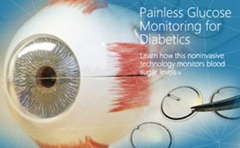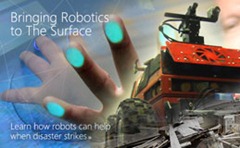July Update from Microsoft Research & Faculty Connection
Functional Contact Lens Monitors Blood Sugar Without Needles – Video
Researchers from the University of Washington and Microsoft Research Connections are working together to develop a non-invasive, technological solution to improve both the health and overall quality of life for diabetics: a contact lens that monitors blood glucose levels. The functional contact lens is an example of how natural user interfaces (NUI) can enable the development of innovative solutions. To learn more, read the blog, Functional Lens Promises to Improve the Quality of Life for Diabetics and Others.
Learn How Robots Can Help When Disaster Strikes – Video
The University of Massachusetts Lowell, Microsoft Surface, and Microsoft Robotics Developer Studio developed a human-robot interaction application to create novel remote controls for rescue robots. Once perfected, this approach could enable emergency responders to safely manoeuvre rescue robots through buildings that are damaged by earthquakes, fire, or even terrorist attacks.
Research in Action
Download Project Daytona: Iterative MapReduce on Windows Azure
The eXtreme Computing Group within Microsoft Research has developed an iterative MapReduce runtime for Windows Azure, code-named Daytona. It enables laboratories, small groups, and individual researchers to use the power of the cloud to analyse data sets on gigabytes or terabytes of data and run large-scale machine-learning algorithms on dozens or hundreds of compute cores. The Project Daytona download includes a deployment guide, developer and user documentation, and code samples for both data analysis algorithms and client application. Learn more:
· Microsoft Research Debuts ‘Daytona’ Azure Analytics Tools
· Microsoft Research Releases Details About "Daytona" at Faculty Summit
· Free Tool Kit to Assist Big-Data Scientists
The Promise of Games in Lifelong Learning
We are pleased to announce the launch of a program that supports collaborations between Microsoft Research Connections and major research institutions to build the foundations for a unified game layer for education. Our first official project is Just Press Play, an experiment to craft gameful experiences for the students of Rochester Institute of Technology undergraduate game design program. (Gameful experiences incorporate the use of game play mechanics that focus on the user's intrinsic motivation—engaging the user in a way that can produce long-lasting and powerful results.)
Microsoft Research Accelerators – Video
Learn about Microsoft Research Accelerators tools and services for academics and researchers that are designed to help scientists, researchers, teachers, and students explore science, analyze and visualize data, and publish the results of their research. This video provides a brief introduction to just a few of our many Research Accelerators, including the Chemistry Add-in for Word, Zentity, Scientific Workflow Workbench, and Try F#.
Project Hawaii SDK: Create Mobile Applications – Video
Find out how you can create cloud-enabled mobile applications with the tools and services that are included in the Project Hawaii software development kit (SDK). Arjmand Samuel, research program manager from Microsoft Research Connections, talks about what the SDK contains and how it can be used to develop Windows Phone applications.
Faculty Summit: Get Information about the Speakers and Presentations and Watch the Videos
The twelfth Microsoft Research Faculty Summit provided a forum for lively debate of the development, application, and funding of technologies in the environmental, medical, and educational spheres over a long period of time. The program consisted of keynote presentations, discussions, panels, workshops, and demonstrations. Learn more about the event and the integral role that industrial research plays in society, education, and technology transfer.
Coming Soon
Kinect for Windows SDK Beta Enhancements Coming Soon
Interest in the Kinect for Windows Software Development Kit (SDK) beta, released on June 16, 2011, has been strong, and we’re delighted to learn that so many developers and innovators who are experimenting with natural user interface (NUI) applications have taken advantage of the SDK to explore the potential of the Kinect sensor. The community has provided us with a lot of good feedback, and in support of our commitment to encourage researchers and enthusiasts in their exploration of the exciting possibilities of the Kinect sensor, we will release a refreshed version of the SDK soon. The upcoming Kinect for Windows SDK beta refresh will address some of the top items you’ve told us about.
Pneumonia Vaccine in Nepal: Clinical Trial Uses Microsoft-Based System
The Oxford University vaccine group is conducting a clinical trial to help save lives by making it easier for Nepalese patients to get a complete round of pneumonia vaccinations. The current vaccination regime consists of two injections administered consecutively; but to complete the regime, a third injection is required six months later. This third injection often does not get administered in Nepal, where it is difficult for many patients to access hospitals. Oxford University’s trial aims to determine whether three vaccines administered in a shorter time period can provide similar pneumonia protection. A system that employs Microsoft SharePoint and InfoPath enabled the vaccine group to create and deploy the clinical trial support infrastructure more quickly and inexpensively than by conventional methods. Oxford University Computing Lab and Microsoft Research Connections developed the system jointly.



